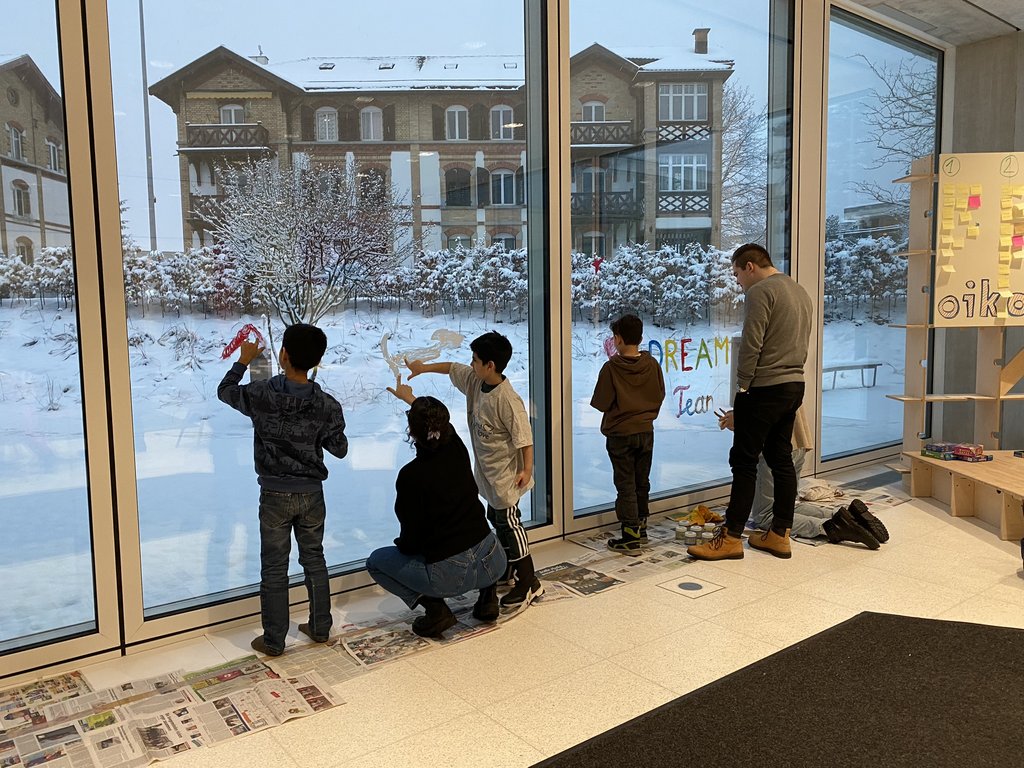Background - 25.08.2023 - 08:30
"DreamTeam": HSG Mentoring Programme that inspires
Accompanying St.Gallen children on their journey to personal development, helping them become confident individuals – this has been the goal of HSG students for a year. We reflect on the mentoring programme with HSG lecturer Michael Peters and two student-participants.

Accompanying St.Gallen children on their journey to personal development, helping them become confident individuals – this has been the goal of HSG students for a year.
"Learning through engagement, responsibility, and a reflective experience" – this is the fundamental idea behind the "Service Learning" approach. In the fall semester of last year, the Bachelor-level course "DreamTeam: Mentoring Program for the Next Generation" brought HSG students together with St.Gallen primary school children says Michael Peters, HSG lecturer and experienced coach, who leads the course along with psychologist Florian Schulz.
The "DreamTeam" program is not about homework help. Instead, "mentors and children spend their free time together, discover new things, build a relationship, and learn to trust each other," says Michael Peters. Mentors and mentees meet weekly and regularly, always without the child's siblings or friends. The mentor's attention is solely focused on the mentee. This creates commitment.
Shared leisure activities
The time spent together is at the heart of the mentoring relationship. The specific activity is secondary. "Feeding ducks, enjoying ice cream or hot chocolate together, playing football or going ice skating. Also, traveling by bus or train, taking walks, reading, painting or having dinner with the child's family – all of these are possibilities," explains Michael Peters. From time to time, a larger outing can also be planned as a highlight. For example, mini-golf, a visit to the indoor pool, cinema, or museum, but also an afternoon at SQUARE or the FC St.Gallen stadium. "Mentors learn to trust that the time they give is essentially enough – the exchange is what counts," emphasizes Peters.
Numerous positive effects of mentoring on the personality development and educational opportunities of primary school children are evidenced by a long-term study by the Institute on Behaviour & Inequality in Bonn. "Children noticeably continue to benefit from their participation in mentoring years after it ends. They become more resilient, navigate different life situations more easily, can overcome challenges, and later find jobs or apprenticeships more easily," notes Peters, summarizing the results of the German partner project “Balu und Du”. The programme boosts children's self-confidence and helps them integrate socially and linguistically into various life contexts. At the same time, mentors learn to motivate and inspire others, actively listen, and empathize with the child's needs. It often happens that students find themselves confronted with their own issues and uncertainties because they see themselves in their mentees, says Michael Peters. The training in the context of their studies promotes essential skills that students can transfer to other areas of life, such as the professional world – empathy, self-reflection, handling boundaries, forming healthy relationships, and maintaining positive conversations.
Learning from each other
Throughout the year, students maintain an online diary in which they record and reflect on all their meetings with their mentees. The course instructors provide weekly feedback on these entries. The mentors receive specialized input on attachment theory, relationship building, conflict resolution, learning theory, integrity promotion, and child protection as part of a companion seminar. The students also exchange experiences with their group during these sessions following the principles of "collegial case consultation," explains Peters. Uncertainties are normal, and conflicts can be solved together. Individual coaching sessions are also possible as needed. There's no secret recipe for creating a friendship between a mentee and mentor. However, Michael Peters is clear that "the commitment and seriousness of the students' involvement in the program determine the success of the mentoring relationship."
Starting from the fall semester of 2023, the DreamTeam course will also be offered at the Master's level. The course instructors aim to focus more on individual coaching to optimally support the students. Michael Peters is pleased that students are sharing their experiences further – the course has received positive feedback.
"DreamTeam" was established for the first time in 2022 at the University of St.Gallen and the Eastern Switzerland University of Applied Sciences as an offering by the Swiss Foundation for Education Promotion and Financing, EDUCA SWISS.
Image: DreamTeam winter celebration at SQUARE